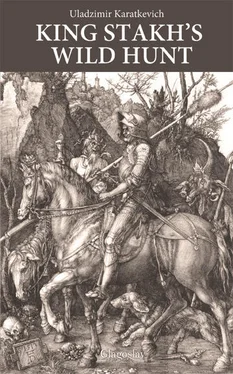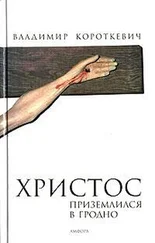“A-a. Let's have a drink
Then after it, another...”
someone howled. And suddenly I remembered that house far away in the fir park, the trees overgrown with moss, the fireplace, the melancholy figure near it. I felt sick at heart. “I'm a drunken pig,” I kept repeating, “we mustn't live on the fat of the land when someone else is in trouble.” So deep was my pity for her that I was on the verge of tears... and immediately I became sober.
The guests were beginning to leave the table.
“Gentlemen,” Dubatoŭk said, “take a little walk, the table has to be refreshed.”
Good God, this had been but the beginning! And everyone was already drunk, as drunk as pigs. It was 8 o'clock in the evening. That was unimportant. It was still early. I knew that having instantly become sober, I wouldn't get drunk again today, nevertheless I decided to drink with caution: I might get stuck in the quagmire — then there would be hell to pay.
We rested, talked. Dubatoŭk showed us a fine collection of weapons. He praised an old sabre very highly, one that he had begged Raman Janoŭski to give him. He said that the Russian damask steel sword could cut through a plate, the Polish “Zygmuntowka” — quite a thick nail, but this one, ours, was a secret that the Tartars had brought with them in the time of Vitaŭt. And inside it was mercury, the blow such that it could cleave not only a copper plate, but a thick block. Nobody believed him; he shouted, ordered Antoś to bring a block. Antoś brought in a short block, the thickness of three human necks, and placed it on the floor.
All grew quiet. Dubatoŭk took aim, grinned, baring his teeth, and suddenly the sabre described an almost invisible half-circle in the air.
Dubatoŭk let out a deep guttural sound, drew the sabre towards himself, and split the block obliquely. He waved his wrist in the air. All kept silent.
“That's the way to do it!” he shouted at us.
I managed at this time to get Śvieciłovič out onto the porch and tell him of all that had occurred at Marsh Firs.
He became very excited, said that he had previously heard something about it, but had not quite believed it.
“And now you believe it?”
“I believe you,” he said simply. “And I promise that while I am alive, not a single hair of her head shall be hurt. Be he devil or ghost or whatever else, I'll stand in his way.”
We arranged to investigate things together, that he would come to see me in a couple of days and tell me all that he had learned in the vicinity of the village (various rumours and gossip might be of definite use). We decided not to get Dubatoŭk involved in this affair as yet: the old man could get very excited and act as was his habit in his devil-may-care way.
Supper continued. We were again treated to food, again to drink. I noticed that Dubatoŭk was filling our wine glasses, both his and mine, equally, and as he drank he kept looking at me testingly. Whenever I drank a glass of wine a look of satisfaction appeared on his face. He was in a way egging me on into a competition. And during intervals he would offer either pancakes with a sauce made of flour, meat, fat, smoked ham and ribs, or else those unusual “shtoniki” — meat drowning in fat, such as saints had never eaten. He was evidently studying me from every angle. I drank but did not get drunk.
The rest, excluding Śvieciłovič, were already in the sort of state when nobody listens to anybody, when one drinks, another tells some love story, a third is doing all he can to make somebody pay attention to some colourful fact in his biography, and a fourth is recalling what a good woman his mother had been, while he, such a drunkard, such a scoundrel, is profaning her memory, living such a dissolute life.
The singing went on:
In the hut's my wife,
At a drinking spree am I.
At the tavern my bullock's tied,
In the devil's keep my lost soul.
Another man drawled his song:
Tell me, my good people,
Where my beloved sleeps.
If in a distant land
Please, God, help him
But if in a widow's bed
Oh! God! Punish him!
But if in a widow's bed...
Someone raised his head from the table and sang his own version of the last line:
Please, God, help him too!
Everybody burst out laughing.
In the meantime Dubatoŭk shook his head as if to chase off his stupor, got up and announced:
“At last I've found a real man among the young aristocrats. He has drunk more than I have, I've become tipsy, but he's fresh, as fresh as a bush in the rain. None of you here would have taken in half as much. Nine of you would have fallen flat on your faces, while the tenth would have mooed like a calf. This is a man! Him and only him, would I gladly have accepted for a friend in my youth.”
Cries from everybody “Glory! Glory!”. Varona alone looked at me bitingly and gloomily. They drank to my health, to the gentry — the salt of the earth, to my future wife.
When the enthusiasm had abated somewhat, Dubatoŭk looked me in the eyes and asked confidentially:
“Getting married?”
I shook my head uncertainly, although I understood very well what he was driving at. He was certain about it, evidently, whereas I had no wish to convince him of the reverse. I liked the old man, he was drunk and might be offended if I openly told him that I hadn't ever thought about it and did not even wish to think about it.
“She's beautiful,” Dubatoŭk continued and sighed, looking at me sadly.
“Who?” I asked.
“My ward.”
Things had gone too far, and to pretend any further was impossible, for otherwise it would have turned out that I was compromising the girl.
“I haven't thought about it,” I said. “But even if I had thought about it, it doesn't depend on me alone. First of all it is necessary to ask her.”
“You are avoiding an answer,” suddenly hissed Varona through his teeth. (I hadn't suspected that he was listening to our quiet conversation.) “You do not want to speak frankly and directly with serious people. You don't want to say that you are after money and a wife of noble birth.”
I was convulsed with pain. Trying to keep calm, I answered:
“I have no intention of getting married. And I consider speaking about a girl in a drunken company of men does no honour to a true gentleman. Stop talking, Varona, don't attract the attention of drunken people to an innocent girl, don't taint her reputation, and I, although it is a terrible insult, forgive you.”
“Ha, ha!” exclaimed Varona. “He forgives me. This pig, this cad.”
“Stop it!” I shouted. “Be quiet! Just think how you are insulting her with each one of your words!”
“Gentlemen! Gentlemen!” Dubatoŭk tried to calm us. “Varona, you are drunk.”
“Think yourself. I once allowed an offence of yours to pass by unnoticed, but in future I won't!”
“You scoundrel!”
“Me?”
“Yes, you!” I shouted so loudly that even those who were sleeping raised their heads from the table. “I'll force you to shut up!”
A knife from the table whisked through the air and fell flat on my hand. I jumped up from my seat, grabbed Varona by the chest and shook him. At the same moment Dubatoŭk grabbed us by the shoulders and separated us, shoving Varona aside.
“Shame on you, Aleś!” Dubatoŭk thundered. “You pup... Make peace immediately!”
“No, wait a moment, Dubatoŭk. This is serious. It's too late. My honour has been insulted,” Varona roared.
“And my honour as host. Who will now come to visit me? Everyone will say that Dubatoŭk treats his guests to duels instead of good vodka.”
“Don't care a straw,” Varona shouted, baring his teeth.
Читать дальше



